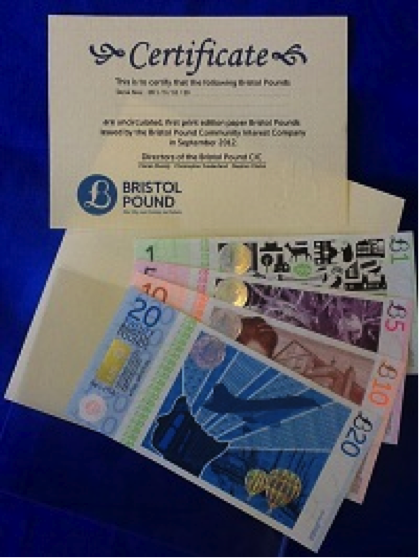The Bristol Pound
April 24, 2013
Contributor: Bristol
Workshop: Social inclusion, job creation, economics / Tools to strengthen the local economy
Bristol launches its own local currency, autumn 2012

Bristol has an extremely high saturation of multi chain retailers (the ‘big four’ are Asda, Morrisons, Tesco’s & Sainsburys) with many independent shops, especially greengrocers disappearing from local neighbourhood high streets. Various initiatives are underway to try to protect and increase the diversity of local retail including the ‘Independents Campaign’ http://bristolindependents.co.uk/ , the Portas pilot http://www.maryportas.com/portaspilots/ in the neighbourhood of Bedminster and the Bristol Pound http://bristolpound.org/
There are currently 140,000 Bristol pounds in circulation. Most transactions are made electronically through mobile phones but the pound notes themselves are readily available at many outlets in the city. Hundreds of traders have signed up to use the currency.
The primary purpose of the scheme is to strengthen the local economy by incentivising people to use independent local businesses. Bristol’s independent businesses are crucial to community identity.
By incentivising spending in independent businesses, the Bristol Pound helps wealth created in Bristol to stay there. Known as the multiplier effect, Bristol Pounds are spent repeatedly within the local economy. With sterling, much of the wealth spent in the city is lost to big multi national business, related management structures, remote shareholders and the boom-bust of the financial banking system. The Bristol Pound can help deepen and diversify the connections between local business people and all the citizens of the region – an important part of building a sustainable regional economy and providing high quality employment.
Local food producers are encouraged to participate in the scheme through the Farm-Link initiative. This ensures favourable terms for using Bristol pounds while providing marketing, publicity and business support. Farm-Link is open to primary producers based within 50 miles of the City of Bristol. Business of all sizes, including individuals, producing goods such as fruit and vegetables, dairy, grain, meat and fish are eligible. Timber and other forestry products such as coppice, wild fruits, nuts and game also qualify. Qualifying businesses may have linked activities, producing secondary (processed) products e.g. cheese, sausages, building materials, bio-fuels etc.
The project took a considerable time to set up with various delays and issues to resolve but was launched with huge media interest on 19th September 2013. Bristol would be supportive in helping other cities to set up their own currency.
Have any Partner City developed their own currency and if so what are the findings to date?